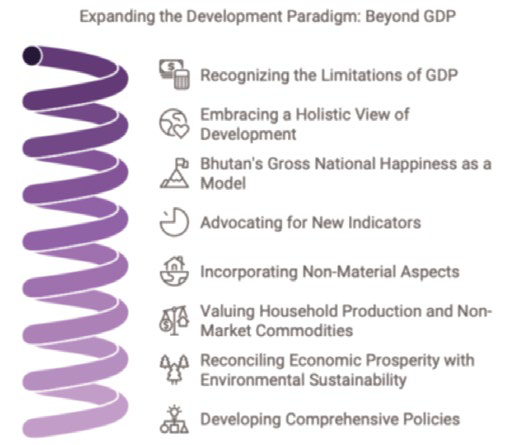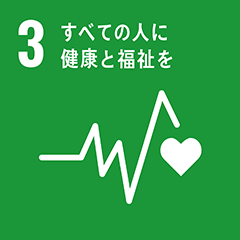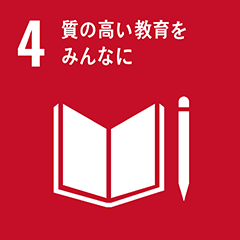Inochi Declaration
Let us address the limitations of current metrics like GDP by developing Integrated Flourishing Measures (IFMs) to capture non-material aspects of societal well-being, such as emotional resilience and cultural vitality.
The prevalent reliance on quantitative metrics, such as Gross Domestic Product (GDP), for assessing progress towards Sustainable Development Goals (SDGs) and national level development remains problematic. This approach significantly limits the scope of understanding and fostering human and societal flourishing. True development encompasses far more than economic growth and material wealth; it includes the non-material dimensions of life such as emotional well-being, cultural and linguistic richness, and psychological as well as religious, spiritual and emotional fulfillment. These aspects, often qualitative and aspirational in nature, escape traditional measurement frameworks but are crucial for a comprehensive view of progress and well-being. Consequently, there’s a pressing need to expand the development paradigm beyond GDP and similar indices to include broader, more inclusive indicators that capture the full spectrum of human experience and societal health.

To address this measurement problem and transcend the limitations of GDP-focused metrics it is recommended to develop and integrate new indicators that can more accurately reflect the non-material aspects of development.
These indicators should aim to capture qualities such as community cohesion, cultural and linguistic vitality, environmental stewardship, and individual and collective well-being. Additionally, it is crucial to incorporate household production and non-market commodities into economic measures to reflect true economic activities. Emphasizing qualitative outcomes alongside quantitative benchmarks, this approach advocates for a balanced assessment framework that values both material and non-material dimensions of flourishing.
By including household production and non-market contributions, we can gain a more comprehensive understanding of economic activities and their impacts on societal well-being. Importantly, this framework should reconcile economic prosperity with environmental sustainability, ensuring that economic growth does not come at the expense of environmental health.
Incorporating household production and non-market commodities into economic measures is essential for capturing the true scope of economic activities and their impacts on societal well-being. Household production, such as caregiving, cooking, and volunteer work, and non-market commodities, like public goods and environmental services, contribute significantly to the economy but are often excluded from traditional economic indicators. By integrating these elements into our economic measures, we can develop policies that more accurately reflect the contributions of all economic activities, ensuring a more comprehensive and inclusive understanding of economic prosperity.
Household production represents a substantial portion of economic activity that remains undervalued in conventional metrics. Recognizing and measuring this work can highlight the critical role it plays in sustaining families and communities, and promote policies that support these often overlooked contributions. Similarly, non-market commodities, including environmental services like clean air and water, are vital to both human and economic health. Valuing these services within economic frameworks encourages sustainable practices and investment in environmental stewardship.
Integrating environmental sustainability into economic indicators can help create policies that promote green growth and resource efficiency. By recognizing the complexity and interdependence of these factors, policy recommendations can guide the formulation of a post-2030 development agenda that truly reflects the aspirations, needs, and challenges of our time. This shift towards a more integrative and systemic understanding of development requires innovative thinking and collaborative efforts among nations, communities, and individuals to redefine what progress means in the 21st century.
With this awareness of the issues at hand, the Society of Meta-Science aims to establish a research network focused on indicator-based and non-indicator-based measurement and the integration of non-material conditions. The network will organize events and workshops involving policymakers. Based on the insights gained through these workshops and other initiatives, the Society will develop Integrated Flourishing Measures (IFMs) that encompass community cohesion, cultural vitality, and environmental stewardship.
The indicators to be included in the IFMs may include:
● Community Cohesion Index: Measures the strength of social bonds and the sense of belonging within communities.
● Cultural Vitality Index: Assesses the diversity and vitality of cultural expressions, as well as the accessibility of cultural experiences for all members of society.
● Language Vitality Index: Evaluates the use of multilingualism and languages in both oral and written forms.
● Environmental Stewardship Indicator: Reflects public engagement in environmental conservation efforts and sustainable lifestyle practices.
● Happiness Index: Includes measures of life satisfaction, emotional well-being, and fulfillment beyond economic status.
The Society of Meta-Science will work to integrate these newly developed IFMs into national statistical systems and international governance metrics. Additionally, it will collaborate with policymakers and stakeholders to promote the use of IFMs in decision-making processes.
In collaboration with organizations like the Society of Meta-Science, the Inochi Forum will actively promote the creation and application of new indicators to measure the flourishing of Inochi.
[References]
・Zwitter, Andrej and Bloch, Carole and Ellis, George F and Hecht, Richard and Hernandez, Ariel and Hoffman, Wakanyi and Rickles, Dean and Sukhomlinova, Victoria and Ura, K (2024) Human Flourishing: An Integrated Systems Approach to the SDGs.
Available at SSRN:
https://ssrn.com/abstract=4904455
or
http://dx.doi.org/10.2139/ssrn.4904455
・Zwitter, Andrej, and Dome, Takuo eds, (2023) Meta-Science: Toward A Science of Meaning and Complex Solutions, University of Groningen Press
[Action Platform]
Economy, Employment and Poverty
[SDGs]




